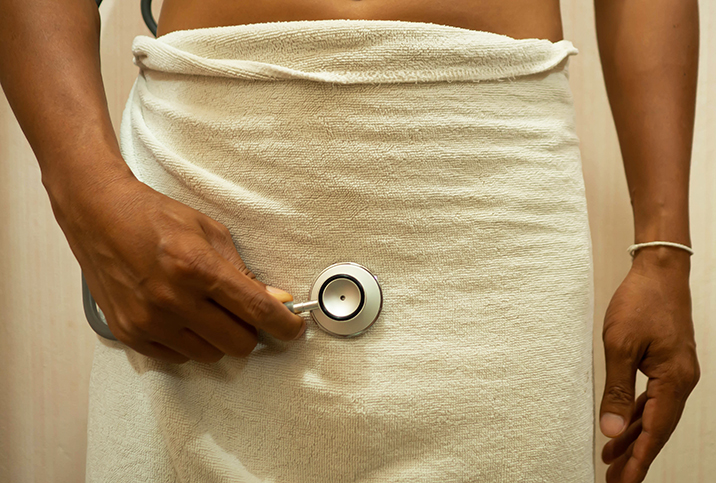Anal Pap Smears: A Screening Test We Shouldn't Ignore

New York—based doctor Evan Goldstein knows plenty about buttholes—as one of the world's leading anal surgeons, he's spent decades fine-tuning his knowledge. Most of us already know that STI checkups and sexual barriers such as condoms are key to maintaining anal health, but Goldstein believes there's a tool in this arsenal of preventive measures that many of us aren't using: anal Pap smears.
These screening tests are less well known than their cervical smear test counterparts, but they're just as vital when it comes to detecting early signs of cancer. "I strongly believe anyone who engages in anal play should undergo not only anal Pap smears, but also full evaluations, both inside and out, with a high-resolution scope," Goldstein said.
Anal cancer prevention
When it comes to anal cancers, there are various types, some more symptomatic than others. The most common by far are squamous cell anal cancers, which usually exhibit a small handful of symptoms. In a 2020 study published in the Annals of Medicine and Surgery, authors found "rectal bleeding, anal pain and sensation of a rectal mass" to be amongst the most common indicators. Goldstein corroborated this, adding a handful of other potential symptoms, including "warts on the anus, genitals, surrounding skin and even the face," which may cause "itching, bleeding, discharge, mucus production, lumps, pains and constipation."
Although anal cancers are still relatively rare—according to the American Cancer Society, the odds of the average person without additional risk factors contracting one during their lifetime is 1 in 500—rates have continuously crept up. According to the aforementioned report, "compared to the cases from the decade 1992 to 2001, the incidence has increased considerably (over 2.9 percent), about 1.9 times for men and 1.5 times for women."
Pap smears and HPV
The rise in anal cancers is largely tied to rising rates of human papillomavirus (HPV), the most common STI (although it can, on rare occasions, be transmitted through nonsexual contact) in the U.S.—statistics released by the Centers for Disease Control (CDC) found 43 million new infections were recorded in 2018 alone, "many among people in their late teens and early 20s." This group of viruses are often asymptomatic and usually go away on their own without treatment, but they can lead to genital warts and they do significantly raise the risk of contracting anal cancer. According to further CDC research, an average of 7,083 people will be diagnosed with anal cancers each year in the U.S. Amongst these cases, an enormous 91 percent will likely be linked to HPV.
Especially if you have HPV, anal Pap smears could be a lifeline. "HPV is the most common STI, affecting mostly gay and bisexual men, as well as transgender and cisgender women," explained Goldstein. "Unfortunately, most people get exposed to HPV at some point in their lives but don't know it, which is why anal Pap smears are important for detection." Even without symptoms, it can still be passed on. "This can cause anal dysplasia, the transformation of cells around the anus into precancerous, abnormal cells, which have a higher likelihood of transitioning into cancerous tumors," Goldstein continued.
High-risk groups
Goldstein also flagged that smears come with the requirement of "appropriate sexual history and evaluation," which are hugely important for marginalized communities in particular, who often avoid seeking medical care due to fear of stigma or stereotyping.
Evidence suggests people with HIV are disproportionately likely to contract anal cancers, too. A 2010 study of women living with HIV, published in Anticancer Research, found "anal cytology is a useful tool to early detect anal dysplasia of high-risk patients." However, Goldstein recommends more comprehensive screening procedures, especially for those at higher risk. "Tests should include anal manometry (which measures the pressures of the sphincters), inside and out evaluations with a hi-res scope, anal Pap smears, blood and urine samples, and throat and anal swabs," he said.
The importance of vaccines
HPV vaccines can usually be accessed through health insurance, and there are a series of programs available to make them more affordable to those without access. (It's estimated that each dose costs around $250 without insurance.) "Lastly, make sure you are being seen by someone who has a complete understanding of how you engage sexually, and who has a full grasp on anal sex," Goldstein concluded. "For many medical professionals, anal health simply isn't on their radar."
When it comes to anal health, it's important to take matters into your own hands—scheduling an anal Pap smear is a key preventive step that could end up saving your life.


















